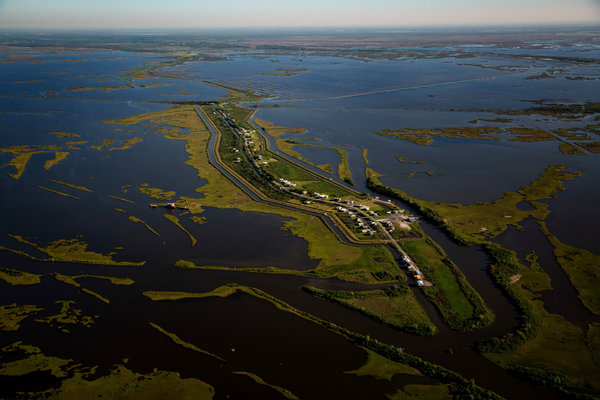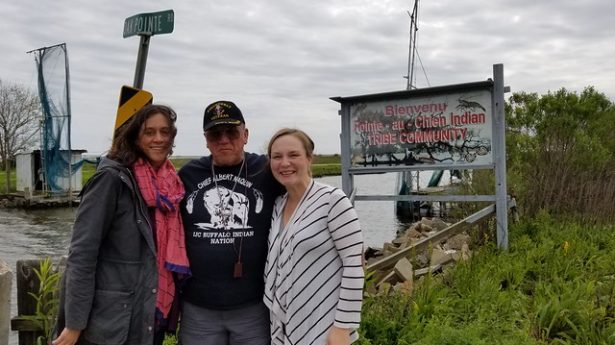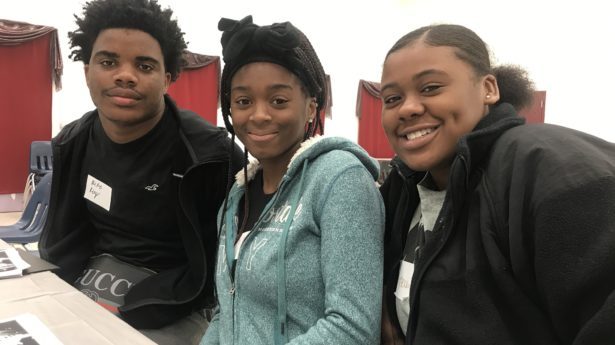The Unitarian Universalist Service Committee advances human rights through grassroots collaborations.
U.S. Tribes Facing Climate Displacement: A Long History of Human-Made Disasters

By Amber Moulton on January 15, 2020
Today, UUSC joins our partners the Isle de Jean Charles Band of Biloxi-Chitimacha-Choctaw Indians of Louisiana; Pointe-au-Chien Indian Tribe; Grand Caillou/Dulac Band of Biloxi-Chitimacha-Choctaw Tribe; the Atakapa-Ishak Chawasha Tribe of the Grand Bayou Indian Village, the Native Village of Kivalina, and the Alaska Institute for Justice to submit a complaint to the United Nations Special Rapporteurs. The complaint lays out the many ways these Indigenous communities’ human rights are violated as they are faced with climate-forced displacement from their lands.
The situation our partners face is a crisis. In 1955, Isle de Jean Charles (IDJC) consisted of 22,000 acres. The Tribal Council’s most recent calculation shows that the livable space on the island is now only 110 acres. The Terrebonne Basin in which these communities sit has lost approximately 502 square miles of wetland since 1932.[1] Areas that was formerly used for cattle, farming, gardens, forests, and even full residential communities are now water. In 1953, Kivalina Island was 55 acres.[2] By 2003, the island had shrunk to 27 acres of livable space and it continues to deteriorate.
The climate crisis has brought increasingly severe storms, sea-level rise, and rising temperatures that cause Arctic sea ice and permafrost to melt and wetlands to subside. These climate impacts have accelerated the rate of land loss these communities face and made them dangerous places to live, especially during storms.
An important lesson from the histories the Tribes share with us is that they face not only the crisis caused by human-caused greenhouse gas emissions like burning fossil fuels or deforestation, but also a combination of other devastating human-made disasters:
Levees: For thousands of years, the Mississippi River has depositing sediment from 31 states and two Canadian provinces across its delta. European settlers reconfigured the Mississippi River after they arrived, building levees that diverted the river. The environment changed, levees caused saltwater intrusion, and the river is no longer depositing sediment into its wetlands. Barrier islands began to deteriorate and land began to disappear, making the coastal region vulnerable to flooding and storms.
Oil and Gas Exploration: In 1901, oil companies discovered fossil fuel deposits in southern Louisiana, which launched a booming oil and gas industry. The industry wreaked ecological havoc, destroying ecosystems through land loss and oil spills, and stealing tribal lands through violence and fraudulent land deals. Oil companies excavated canals across these Tribes’ territory. Oil and gas companies have cut over 10,000 miles of canals across coastal Louisiana.[3] The canals cause saltwater intrusion, causing plants to die and the land to sink.
Colonialism: Inupiaq communities have resided in what is now northwestern Alaska for thousands of years. Historically, the island where Kivalina sits had been used by Inupiaq people for seasonal hunting and fishing, not permanent habitation. The United States Congress authorized the building of schools in rural Alaska in 1905. Government authorities built a school on the island of Kivalina and informed people in the region that they had to bring children to school or face imprisonment.[4] The people of Kivalina noted in the very first years of the permanent settlement that this was not a safe place to live year-round. As early as 1910, reports from the school committee document that residents wished to move because of the risks of erosion.
The impacts of colonialism are clear today in the decades-long struggles the Louisiana Tribes have undertaken simply to be recognized by the federal government of the United States. They are currently not federally recognized. This lack of recognition has dire impacts, for example:
When the 2010 Deepwater Horizon Oil Spill spewed 200 million gallons of crude oil into the Gulf, it despoiled the Tribes’ traditional lands and destroyed the traditional subsistence fishing practices of Tribal citizens, yet the Tribes were not directly consulted or included in restoration projects or discussions about how the billions of dollars of BP money the state received.
In 2015, the Isle de Jean Charles Tribe submitted a proposal to receive U.S. Housing and Urban Development funds for its tribe-led resettlement. The Tribe’s project was chosen and allocated $48 million, but only the state – not the Tribe – was authorized to receive the funds. The Tribe has not received those funds and the state has proceeded with a resettlement project that is not led by the Tribe.
UUSC has entered into partnership with these Tribes to support their ongoing quests to find solutions to the ways they are threatened by these human-made disasters. UUSC supports the Tribes by supporting their self-determination. The complaint to the Special Rapporteurs emerged from convenings in which we brought together Tribes to co-develop strategies. We have worked collaboratively with the Tribes to develop narratives of the ways the climate crisis impacts the communities. UUSC has partnered with the Tribes and the Alaska Institute for Justice (AIJ) to analyze those narratives and develop the complaint. This is one important step in what we anticipate will be a longstanding and deeply impactful coalition-building effort.
Photo Credit: Isle de Jean Charles Tribe
***
About UUSC: Guided by the belief that all people have inherent worth and dignity, UUSC advances human rights globally by partnering with affected communities who are confronting injustice, mobilizing to challenge oppressive systems, and inspiring and sustaining spiritually grounded activism for justice. We invite you to join us in this journey toward realizing a better future!

